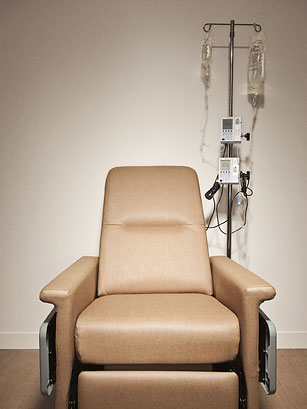
Patients who decline chemotherapy are often fearful of the side effects
It was the kind of case you never forget. Sean Ransom was a psychology intern at a cancer center in 2005 when he was sent a patient, a widow in her 80s, who had just been diagnosed with a treatable form of lung cancer. Her oncologist had recommended surgery and chemotherapy, but she had turned him down. "After interviewing her, it seemed that she had a kind of depression common in older patients — not really a lot of sadness but boredom and no real pleasure in life," says Ransom, who is now the director of the Friedler Center for Psychosocial Oncology at Tulane Cancer Center.
The patient didn't believe she was depressed but was curious enough to start taking antidepressants and go to a few counseling sessions just in case. After a month or so, she returned and said, "You were right. I must have been depressed, because I feel so much better now. Things are more enjoyable."
"So you've decided to get treatment," said Ransom.
"No. I still don't want treatment. I just thought you'd like to know that you were right about the depression."
Ransom was surprised, but the patient explained that she didn't want to go through the suffering of chemotherapy. He took her to the infusion center, and she agreed that it didn't look as bad as she had feared. But when Ransom again asked if she would get treatment, she still declined. "I'm alone. I've lived a good life, but I miss my husband," she said. "I'm happy with what my life has been. I don't want treatment." Ransom bade her farewell, thinking he would never see her again, but she returned at the end of his internship year, thinner and more wan but still resolute, to ask if he would speak to her daughter, who was struggling with her mother's decision. "That might have been the only glimpse of regret that I saw — she didn't like that her daughter was sad — but she never seemed to be ambivalent about her choice," he recalls.
In the research literature, they are but a footnote — the small minority who refuse or drop out of treatment. But to clinicians like Ransom, they are the cases that continue to trouble them for years. There's something unnerving, outrageous even, about refusing treatment that might beat cancer or at least prolong life, especially when so many patients continue to seek help even when their disease is no longer treatable.
"Cancer receives a special status," says Dr. Vic Velanovich, the director of general surgery at the University of South Florida. "Unlike with any other disease, the federal government declared a war on cancer, so with all this effort, how could you possibly refuse treatment?" And yet Velanovich has surveyed people who have done just that. "It's actually not that unusual," he says, "particularly in the older age group" — which accounts for the majority of cancer patients. "But it's certainly not just older patients either."
It is a phenomenon quite distinct from that of people who, in the last weeks of their life and generally in great pain, refuse food and water or otherwise show, to use the clinical term for it, a "desire for hastened death." Instead, treatment refusers are often at the beginning of their cancer journey, and the interventions they refuse are considered active in that they are intended to cure or control rather than palliate the disease. While stories about Christian Scientists relying on prayer or Jehovah's Witnesses refusing blood transfusions are the ones that wind up in the news, most people who refuse treatment are not doing so for religious reasons or even out of a deep mistrust of modern medicine. In fact, many patients will accept part of a doctor's recommendation — surgery to remove a tumor, say — only to reject adjuvant therapy such as chemotherapy or radiation that is often the next step.
For these people, the relevant fact is often that "unlike most drugs, which provide the high possibility of benefit with the possibility of harm, many anticancer drugs, especially chemotherapy, provide near certainty of harm with only a possibility of benefits," as Nancy Evans, a breast-cancer activist and health journalist, has put it. After being diagnosed at the age of 53, Evans underwent surgery and radiation and began to take tamoxifen but found that it wiped out her memory so badly that she stopped. "Doctors said I was taking a real risk, but it's now 20 years later, so I think I made the right choice," she says.